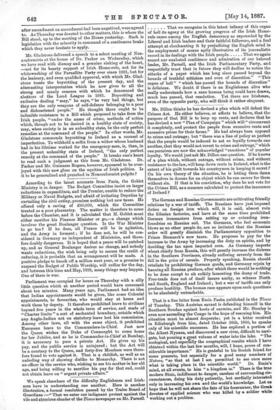Parliament was occupied for hours on Thursday with a silly
little question which at another period would have consumed about ten minutes. Many years ago, Parliament had an idea that Indian appointments would be given, like some Colonial appointments, to favourites, who would stay at home and work them by deputy. It therefore prohibited leave to civilians beyond five years in the whole term of service, and made of " Charter limits " a sort of enchanted boundary, outside which any Anglo-Indian not on statutory leave lost his commission. Among other laws, all with the same object, it prohibited European leave to the Commanders-in-Chief. Just now the Queen wishes the Duke of Connaught to come home for her Jubilee, and as he is Commander-in-Chief at Bombay, it is necessary to pass a private Act. He gives up his pay, and the publics service is uninjured ; but the Act will be a courtesy to the Queen, and forty-five Members were there- fore found to vote against it. That is a childish, as well as an unfeeling way of showing dislike to Monarchy. There is not an officer in the service who, wishing to see his mother in her old age, and being willing to sacrifice his pay for that end, could not obtain leave on " urgent private affairs."


































 Previous page
Previous page